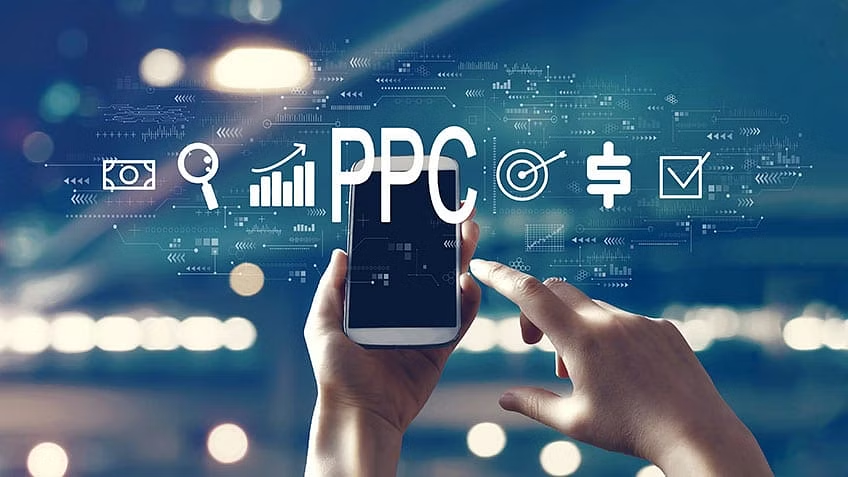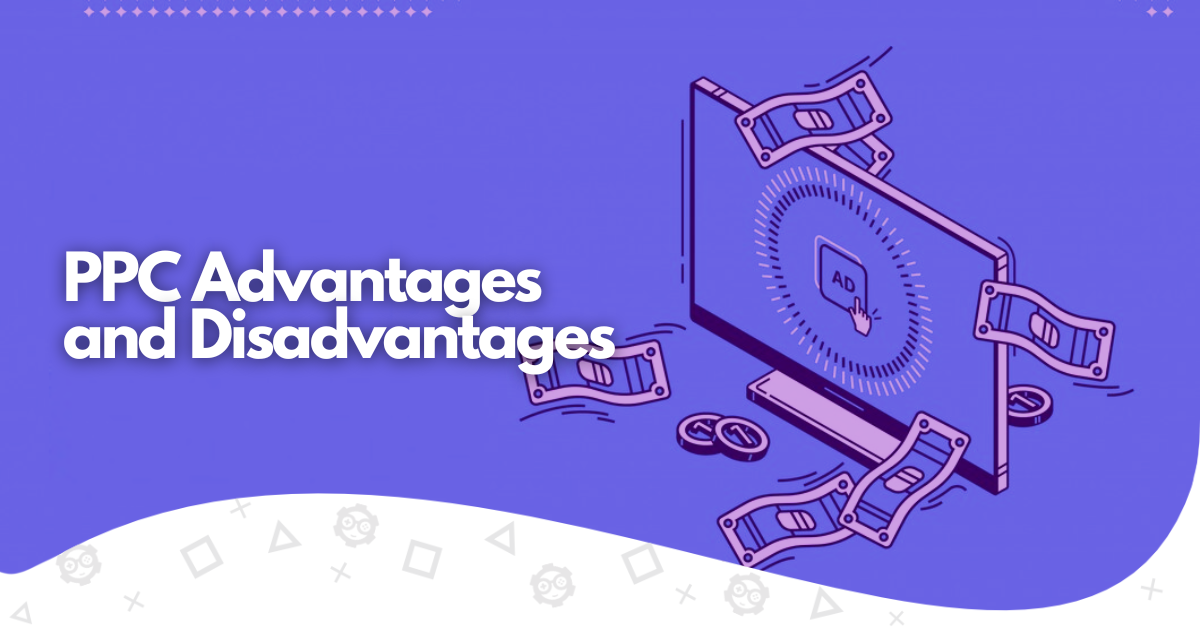In the ever-evolving digital marketing landscape, Pay-per-click (PPC) advertising is a powerful tool for businesses aiming to boost their online presence. This article delves into the intricacies of PPC, shedding light on the advantages and disadvantages of harnessing this dynamic strategy. From PPC campaigns to effective keywords, let’s unravel the potential of PPC and its impact on your digital marketing endeavors.
What is PPC

Pay Per Click, commonly known as PPC, is a dynamic and results-oriented digital marketing strategy advertisers employ to drive targeted website traffic. With PPC advertising, businesses can bid on specific keywords relevant to their products or services. This form of online advertising allows advertisers to display their ads on search engine results pages (SERPs) when users search for related terms.
PPC operates on a simple yet effective premise: advertisers only pay when their ad is clicked. This pay-as-you-go model provides businesses a cost-effective way to promote their products or services, especially for those with a limited budget. Unlike organic searches, where achieving top rankings can take time and SEO tactics play a crucial role, PPC offers immediate results and complete control over ad placements.
By leveraging platforms like Google Ads, advertisers can create targeted campaigns focusing on particular keywords, user interests, and demographics. This precision allows businesses to tailor their marketing efforts to a specific audience, ensuring that their ads are displayed to users more likely to be interested in their offerings.
However, like any marketing strategy, PPC comes with its set of advantages and disadvantages. Let’s explore these aspects to help you make informed decisions when incorporating PPC into your digital marketing arsenal.
How PPC Ads Work

Pay-per-click (PPC) advertising operates on a straightforward auction-based model, where advertisers bid on keywords relevant to their target audience. Here’s a step-by-step breakdown of how PPC works.
Keyword Selection: Advertisers identify relevant keywords related to their products or services. These keywords are crucial to determine when and where their ads will appear.
Ad Auction: When a user initiates a search on a search engine, an ad auction takes place in real time. The search engine evaluates bids, ad quality, and relevance to determine which ads will be displayed.
Bid Amount: Advertisers set a maximum bid amount, indicating the highest price they will pay for a click on their ad. However, the actual cost per click (CPC) may be lower, influenced by competitor bids and ad quality.
Ad Placement: The search engine ranks ads based on bid amount and ad quality. The goal is to provide users with the most relevant and high-quality ads for their search queries.
Ad Display: Winning ads are displayed on the search engine results pages (SERPs) when users search for the selected keywords. Advertisers only pay when a user clicks on their ad; hence the term “Pay Per Click.”
Targeting Options: Advertisers can refine their audience targeting based on location, demographics, device type, and even the time of day. This ensures that ads reach the most relevant audience.
Budget Control: Advertisers have control over their budget, setting daily or campaign budgets to manage their spending. This flexibility allows businesses to allocate resources strategically.
Performance Monitoring: Advertisers continually monitor the performance of their PPC campaigns through analytics and performance metrics. This data helps refine strategies, optimize ad content, and improve overall PPC marketing campaign performance.
Ad Visibility: PPC Provides immediate visibility on search engine results, allowing businesses to reach their target audience quickly. Unlike organic methods, where achieving top rankings takes time, PPC offers instant exposure.
Understanding how pay-per-click advertising works empowers businesses to make informed decisions when crafting and managing their campaigns. By strategically selecting keywords, setting competitive bids, and optimizing ad content, advertisers can maximize the benefits of PPC advertising and achieve their marketing goals.
Advantages of Using PPC

Pay-per-click (PPC) advertising is a dynamic and results-driven strategy with numerous advantages that can significantly impact a business’s online presence. Here are the key advantages of incorporating PPC into your digital marketing arsenal:
Immediate Results
Unlike organic methods, PPC provides instant visibility on search engine results pages (SERPs). This immediacy is invaluable for businesses looking to generate quick traffic and results. While PPC provides instant visibility on search engine results pages (SERPs), it takes time for the campaign to work properly. According to a study by WebFx, it takes an average of 3-4 months to get the best results from a PPC campaign.
Complete Control
Advertisers have complete control over their PPC campaigns, from budget allocation to ad content. This control allows quick adjustments to optimize performance and align with business goals.
Targeted Advertising
PPC enables precise targeting based on keywords, demographics, location, and device type. This precision ensures that ads are displayed to a specific audience likely to be interested in the products or services offered. According to a study by ScandiWeb, businesses that use targeted advertising get relevant traffic and +731% in Revenue.
Cost-Effective
PPC operates on a pay-as-you-go model, meaning advertisers only pay when users click on their ad. This cost-effective approach allows businesses with limited budgets to compete on a level playing field. According to a study by Google, businesses that use PPC advertising see an average return on investment (ROI) of $2 for every $1 spent.
Measurable Results
PPC campaigns provide detailed analytics and performance metrics. Advertisers can track clicks, impressions, conversions, and more, offering valuable insights into the effectiveness of their campaigns.
Strategic Flexibility
Advertisers can make real-time adjustments to their campaigns based on performance data. This flexibility allows for continuous optimization, ensuring the budget is allocated to the most effective strategies.
Top Ad Placement
Successful campaigns can secure top positions on search engines, increasing visibility and click-through rates This prime ad placement enhances brand exposure and attracts more targeted traffic for your marketing campaigns.
Relevant Keywords
PPC allows businesses to bid on specific keywords relevant to their products or services. This ensures that ads are displayed to users actively searching for related information, increasing the likelihood of conversions.
Immediate Entry into Competitive Markets
PPC is an effective way for new businesses to gain a foothold in competitive markets. With a well-optimized PPC strategy, even smaller businesses can compete with industry giants for top ad placements in search results.
Quick Testing and Optimization
PPC campaigns provide a platform for testing different ad creatives, keywords, and targeting options. This quick testing allows advertisers to identify what works best and optimize their campaigns accordingly.
Brand Exposure
PPC not only drives direct response but also enhances brand visibility. Consistent ad presence builds brand recognition, even if users don’t click on the ad immediately.
Adaptability to Trends
PPC allows businesses to capitalize on current trends and events by quickly adjusting keywords and ad content. This adaptability ensures that campaigns stay relevant in a dynamic online landscape.
In conclusion, PPC advertising offers a range of advantages that make it a powerful tool for businesses seeking rapid, targeted, and measurable results in the competitive digital space. By leveraging the strengths of PPC, businesses can enhance their online presence, attract quality leads, and achieve their marketing objectives.
Disadvantages of Using PPC

While pay-per-click (PPC) advertising offers numerous benefits, it is essential to be aware of the potential drawbacks of this dynamic digital marketing strategy. Understanding the disadvantages helps businesses make informed decisions and navigate the challenges effectively.
Costs Can Add Up Quickly
Although PPC allows for precise budget control, the costs can accumulate rapidly, particularly in competitive industries. Clicks on popular keywords may be expensive, impacting the overall campaign budget. For example, the keyword “insurance” is the most expensive keyword, with an average cost per click (CPC) of $54.91.
Dependence on Budget
The effectiveness of a PPC campaign is closely tied to the allocated budget. Once the budget is exhausted, the ads will no longer appear, potentially resulting in a sudden drop in visibility. This can be especially problematic if the campaign was driving a significant amount of traffic to the website.
For example, a study by The Hoth found that if a Google Ads campaign is spread evenly across 5 ad campaigns with a daily budget of $50, each product will only receive a limited amount of promotion per day (10 clicks each).
Requires Ongoing Management
Successful PPC campaigns demand continuous monitoring and optimization. Advertisers must regularly analyze performance metrics, adjust bidding strategies, and refine ad content to maintain effectiveness.
Click Fraud Risks
Click fraud, where competitors or automated systems generate fraudulent clicks on ads, is a concern in PPC advertising. This can lead to inflated costs and reduced ROI if not actively monitored.
Ad Blindness and Ad Blocking
Users may develop ad blindness and automatically ignore or overlook paid advertisements on SERPs. Additionally, the prevalence of ad-blocking software can further limit the reach of PPC campaigns.
Bidding Wars
In highly competitive industries, bidding wars for top ad placements can drive up costs. Advertisers may find themselves in intense competition, leading to higher CPC and potentially diminishing ROI
Learning Curve
Mastering the intricacies of PPC advertising requires a learning curve. Advertisers must understand bidding strategies, keyword selection, and campaign optimization to achieve optimal results.
Not Ideal for Every Business
While PPC is effective for many businesses, there may be better fits for some. Industries with low-profit margins or those with products/services that have long sales cycles might find other marketing strategies more suitable.
Limited Long-Term Benefits
Unlike SEO efforts that can result in sustained visibility over time, PPC’s benefits are immediate but may diminish once the campaign stops. Achieving long-term success requires ongoing investment.
Ad Content Restrictions
PPC platforms often have restrictions on ad content, limiting creativity and messaging. Advertisers must adhere to guidelines, potentially hindering the ability to convey unique selling propositions effectively.
Risk of Irrelevant Clicks
Despite precise targeting options, there is a risk of attracting clicks from users who are not genuinely interested in the product or service. This can lead to higher costs without corresponding conversions.
Dependency on Search Engines
PPC heavily relies on search engines, especially platforms like Google Ads. Changes in algorithms or policies can impact campaign performance, and advertisers have limited control over these external factors.
In conclusion, while PPC is a potent marketing tool, businesses should carefully weigh the advantages alongside the disadvantages of PPC. A well-informed and strategically managed PPC campaign can mitigate these challenges, ensuring a more successful and cost-effective digital advertising effort.
Final Words
In the ever-evolving digital marketing landscape, using pay-per-click (PPC) advertising can be a game-changer for businesses aiming to thrive online. From Google Ads to targeting a particular keyword, PPC efforts provide immediate results and control unmatched by other advertising methods. Digital marketers can strategically manage their paid ads, tailor ad listings to the right audience, and adapt to the latest trends in the industry.
However, it’s crucial to recognize the potential disadvantages, such as the risks associated with bidding wars and the need for continuous management to ensure small adjustments yield the best results.
For small businesses looking to establish a robust online presence, PPC offers a cost-effective solution with low initial investments. The ability to stop paying for ads when needed and manage campaigns properly allows businesses to stay within their own budget constraints.
Despite the advantages, challenges arise, such as the dependency on paid search and the constant competition with competitors’ ads. Digital marketers must navigate these complexities by optimizing landing pages, avoiding the bidding war, and ensuring that each click campaign is strategically managed. By investing time, skills, and resources wisely, businesses can leverage PPC services to secure a top spot in search engine results, drive profit, and succeed in the competitive online marketplace.

A PPC specialist who started with organic social media. For several years, the core of his activities are:- Google Ads, Microsoft Ads, Meta Ads, TikTok Ads, Twitter Ads, Linkedin Ads. He has led campaigns with a global reach, e.g. for FootballTeam, G2A, ETOTO, as well as many smaller campaigns in the sports, construction and financial industries. Has full focus on ROAS. Privately, a fan of football, history of wars and Star Wars.

